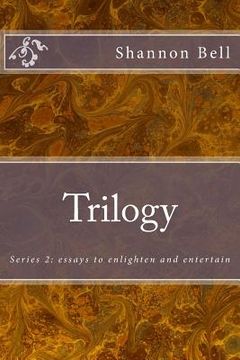Share
Trilogy: Series 2: essays to enlighten and entertain (in English)
Shannon Bell
(Author)
·
Createspace Independent Publishing Platform
· Paperback
Trilogy: Series 2: essays to enlighten and entertain (in English) - Bell, Shannon
$ 4.30
$ 5.38
You save: $ 1.08
Choose the list to add your product or create one New List
✓ Product added successfully to the Wishlist.
Go to My WishlistsIt will be shipped from our warehouse between
Monday, June 17 and
Tuesday, June 18.
You will receive it anywhere in United States between 1 and 3 business days after shipment.
Synopsis "Trilogy: Series 2: essays to enlighten and entertain (in English)"
Trilogy, Series 2: essays to enlighten and entertain. In series 1, I explore how Sophocles uses imagery in Oedipus, how crime and punishment are related in Dante's Inferno, and why Frankenstein offers a critique of the human condition. This second series investigates the storytelling traditions portrayed in Samuel Taylor Coleridge's 'The Rime of the Ancyent Marinere', and how they might represent a narrative of modernity; Bram Stoker's novel, Dracula, is discussed in terms of how it conveys the anxieties of an emerging modernity at the fin-de-siècle, how tensions between tradition and modernity are revealed in the novel, and how the significance of new forms of transport and technology (e.g. trains, photography, typewriters) play a major role in the narrative; and series 2 concludes with an essay on the horrors of honesty in Joseph Conrad's Heart of Darkness. Series 3 begins by questioning the ideology behind Daniel Defoe's Robinson Crusoe. The following essay discusses Charlotte Brontë's Jane Eyre and Thornfield's significance as the physical and ideological setting where the development/deterioration in the characters of Jane, Bertha and Mr Rochester takes place. To end the trilogy, F. W. Murnau's 1922 film Nosferatu and the very nature of cinema is assessed, in Nosferatu: the ghost of cinema itself. The author sincerely hopes that this trilogy of essays will be read with enjoyment, since they have been written to entertain as well as to enlighten.
- 0% (0)
- 0% (0)
- 0% (0)
- 0% (0)
- 0% (0)
All books in our catalog are Original.
The book is written in English.
The binding of this edition is Paperback.
✓ Producto agregado correctamente al carro, Ir a Pagar.

